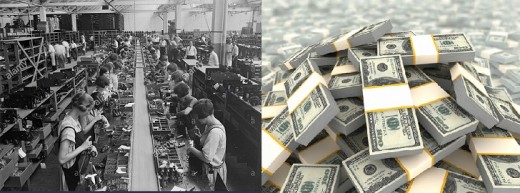Differentiating Between Wealth and Capital

The Question
Since the dawn of capitalism in the 6th century B.C.E., society has, by and large, equated money with wealth. We usually tend to think of someone who has a lot of money as someone is wealthy. However, the growing collective dissatisfaction with capitalism and the narrative surrounding viable alternatives strongly urges for the understanding that wealth and capital are not the same thing. One does not necessarily translate to the other. But, what determines the difference? And how does that difference influence the way a society's politico-economic structure is arranged? The difference lies within the types of values that are intrinsic to each one.
Determining the Value of Wealth
When we examine the value of wealth, we see that wealth contains two different types of value. The first is called use value. Use value is achieved when a commodity fulfills a need not otherwise fulfilled by what nature produces. Take cotton for instance. Cotton is naturally produced by nature. It can be used to fulfill a number of needs but for simplicity's sake, we'll focus on just one; the production of clothing. The fundamental need for clothing is to keep people protected from the elements. Since nature does not itself provide humans with clothing, it must be produced by humans. Cotton serves this purpose well as it is protective, insulating and relatively durable but, it cannot serve this purpose on it's own without human intervention. It's not like people can just go and pick cotton and it magically becomes clothing. No. Their are tools that have to be used in order to harvest the cotton, refine the cotton, make it ready to sew, etc. Then it has to be dyed and patterned and sewn all with the use of tools that make these processes possible and efficient. Thus it follows that cotton can be used to make clothing and fulfill the need with the use of the tools that are manufactured for that purpose. Therein lies both the use value of cotton as well as the use value of the means of producing clothing. However, cotton also contains another type of value. This value is called exchange value. Exchange value is found in the commodity's ability to be exchanged for other products and commodities. Rice for example. Although rice does not grow well in the same climates as does cotton, it is still a staple grain that fulfills the nutritional needs of people who do not readily have access to it; much like cotton fulfills the material needs of people who do not readily have access to it. If a commodity can be exchanged to procure other useful necessities that cannot otherwise be acquired by the people who need them, then the commodity possess exchange value. Therefore, wealth can be considered to lie within the value found in what is used to produce or refine commodities containing both use value and exchange value as well as as the commodities themselves. Translated to a more contemporary dynamic, we could use automatic machinery as another example. The use value of a printing press is found in the press's ability to mass produce printed information for distribution. The exchange value could be found in replicating the printing press and exchanging it for, say, a lumber mill. Alternatively, what is produced by both the printing press and the lumber mill could also be considered to possess both use value and exchange value. Paper from the lumber mill could be exchanged for literature from the printing press. Granted, these are just oversimplified examples, but they serve to illustrate the types of values that are found in commodities, products, and resources. These values are what determine the difference between capital and wealth.
Determining the Value of Capital
So where do we find value in capital? Well, let's take a look at the different types of capital and examine where we can find value. Contemporary capital essentially comes in two different forms; cash and credit. Even still, we can reduce credit down to cash because cash is exchanged for credit. So what use value does cash possess? To answer that, we would have to figure out what need it fulfills for humans that is not otherwise fulfilled by what nature produces. Can cash be used for nutritional value? No. Although, technically, you could eat cash if you were so inclined, ingesting it would still not offer any health benefit to the body. Ergo, it does not fulfill any nutritional need. Can cash be used to ride or drive? No. So cash itself cannot fulfill transportation needs. Can cash be used to build shelter from the elements? Possibly. But it wouldn't be a very sturdy shelter and it's lack of inefficiency would soon render it obsolete as material for housing. Can we use cash as clothing? Well, considering cash is made of cotton and linen, technically it could be used for that. However, it wouldn't need to be made into cash first to fulfill that need. Thus, it speaks more to the use value of cotton and linen than it does to the value of cash. Can cash be used as energy source? Yes. Cash can be burned offering both light and heat. Unfortunately, it burns out rather rapidly and the energy released from burning it would be ephemeral. Here, we find ourselves in a very similar situation as when we tried to use it to build shelter. Cash would very soon be replaced by more efficient methods of energy use and become obsolete. Moreover, cash would have no hierarchical quantitative spectrum of value.What this means is that because the energy received from burning a $100 bill would be the same as from burning a $1 bill, then the worth of the two different bills would be equal. What about the metal from coins? The bronze, nickle, and other metals used to make coins can certainly be melted down and used to fulfill a whole host of needs. However, again, much like trying to wear cash, it wouldn't need to be made into coins first to fulfill that need and thus speaks more about the use value of those metals than it does about the coins. As we've seen, capital contains no actual use value. Capital cannot be used to fulfill a need that is not otherwise naturally met. The only value that cash possess is exchange value. Cash can be exchanged to procure products, resources, and commodities with use value, but does not itself contain use value. Thus it stands that the difference between wealth and capital is that wealth contains both use value as well as exchange value whereas capital contains only exchange value.
What the Difference Means to Society
Now that the difference between the two economic conditions is more clear, it must be understood what is meant when socialists and communists talk about a redistribution of wealth and how that differs from the narrative given by pseudo-socialist politicians and state agents who use the same language. When pseudo-socialist politicians and neo-liberals talk about a redistribution of wealth, what they really mean is a redistribution of capital. Essentially, what they envision happening is like what happens at a card table. A dealer hands out cards until everyone has an equal amount. At best, this is a misguided attempt to equalize society which lacks a proper in depth analysis of the long term affects and historical overview that the role capital plays in society. At worst, it is a myopic pacification technique designed to placate people who lack the understanding of what would happen after the capital is redistributed. A redistribution of capital has no other basis than to ease the burden that a life lived under capitalism places upon the backs of the workers. The contradiction of redistributing capital lies in the inevitable re-concentration of it. Redistributing capital without a fundamental change of the economic and social structures within which capital functions would eventuate in the capital being unevenly distributed into the hands of the same few people as it is now. If the socio-economic arrangement that allowed for the concentration of capital in the first place does not change, how could we possibly expect a different outcome after capital is redistributed? The issue being overlooked is the wealth. It is the wealth that generated the capital which, in turn, was used to secure the wealth which, subsequently, was used to generate more capital. If capital is redistributed but wealth remains in the hands of those who privatize it in order to legitimize the theft of the capital, then it stands to reason that it must be the wealth that needs to be redistributed and not the capital.
Valid Justification
But on what basis do we justify the redistribution of wealth? Does the wealth not rightfully belong to those who possess it? The answer is definitively no, it does not. Possession of property under capitalism does not automatically legitimize rightful ownership. So far, we have explored the 'why' of established value. However, in order to understand the justification of wealth redistribution, it is now necessary to understand the 'how' of wealth. Once understanding of the origin of value is established, the redistribution of wealth into the hands of those to whom it rightfully belongs becomes clear. What must be taken into account is the human aspect of production. Resources and commodities that must be produced outside of what nature provides could not fulfill human needs without the necessary labor required to do so. Therefore, it necessarily follows that value, in any capacity, originates from human labor power. If those who provide the labor create the value, then the worth of the wealth that is generated by value belongs to those who supply the labor. Yet, this is far from the case. Those who possess the wealth that fulfills needs do not sow, harvest, refine, or operate the wealth itself. Instead, due to the brutality and forced imposition of this expediency, the economic situation is arranged where employment of labor by those who possess the wealth is exchanged for mere remnants of the wealth with those who create the value. Conclusively, it is those who privately possess the wealth that are stealing it from those who create the value.
Conclusion
The difference between capital and wealth, as well as their relationship with each other, stands to vastly influence the direction of society's progress. Understanding those differences and how they shape societal norms is imperative to any restructuring of social inequality. Furthermore, the human relationship to wealth and capital is just as important, and indeed, inextricable with our relationship to labor. Any society that hopes to progress in the interests of all who are apart of it, must be able to understand these differences as well as the dynamics involved with our relationships to them. As it has been shown, capital will always eventuate in the concentration of it. A concentration of capital necessarily translates to a concentration of wealth. Redistributing capital can only culminate in a reemergence of the same problematic inequalities we face today. Thus the inevitable conclusion drawn from this understanding that seeks to develop a free, just, and egalitarian society would see an end to the existence of capital and a redistribution of wealth from private ownership to public possession.






